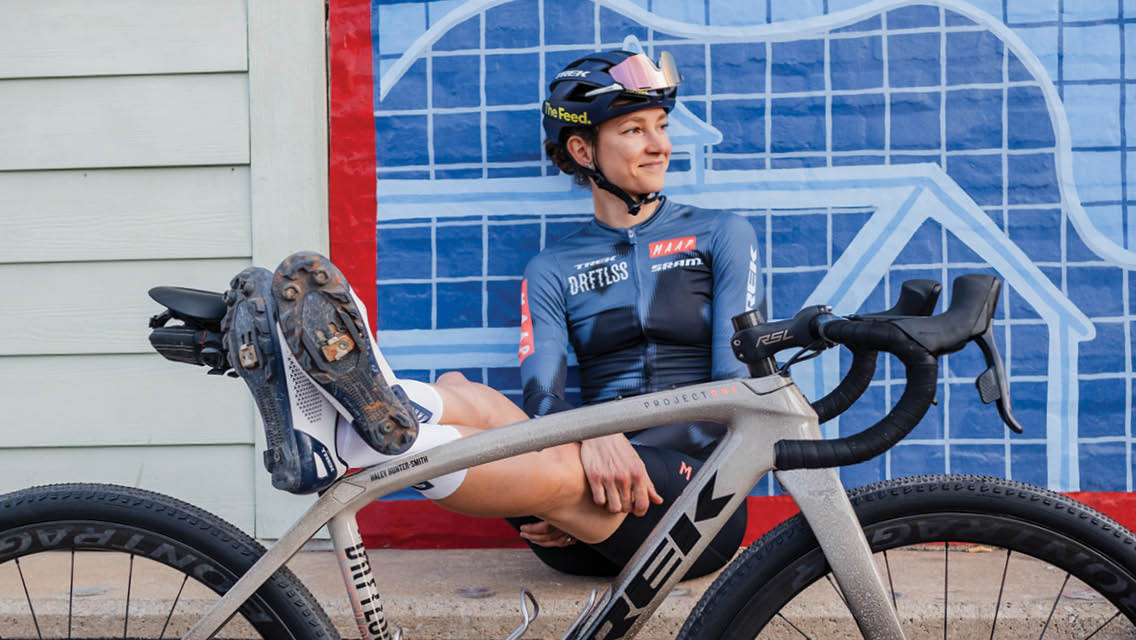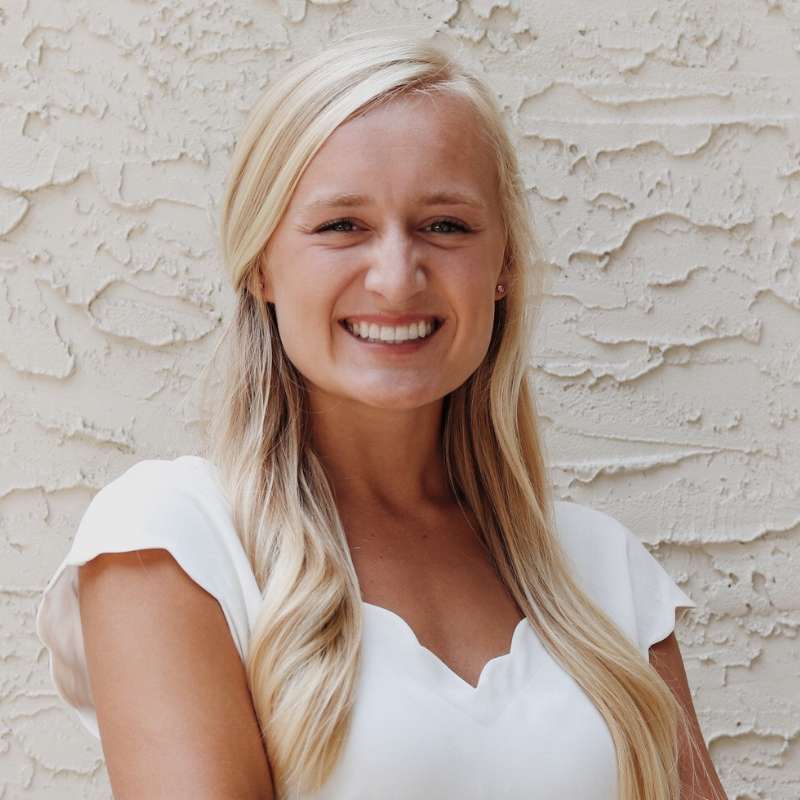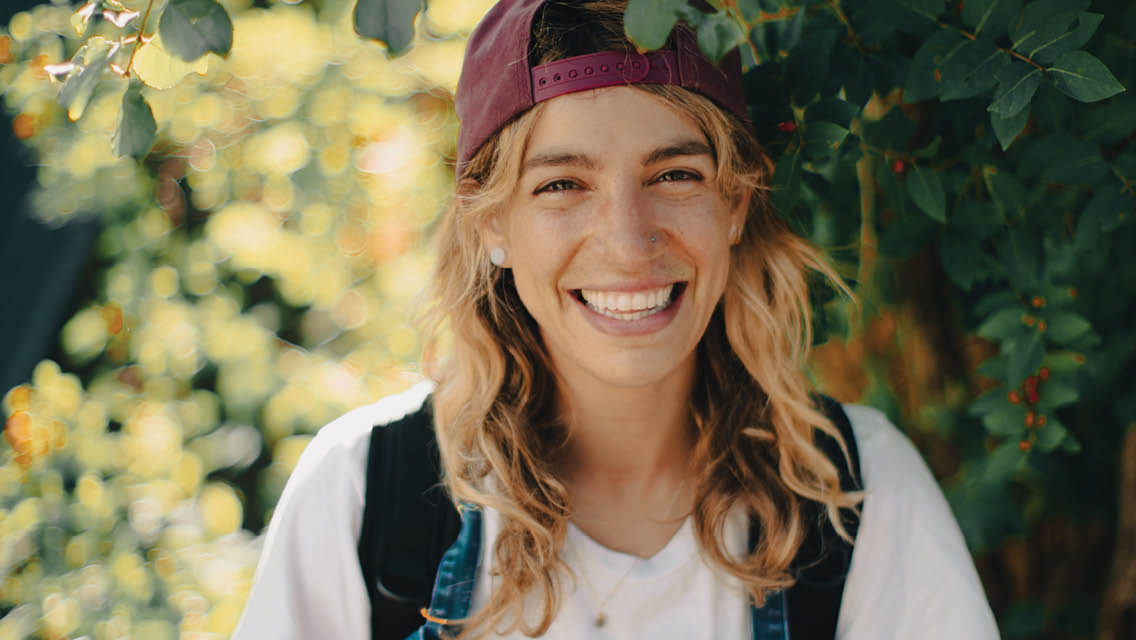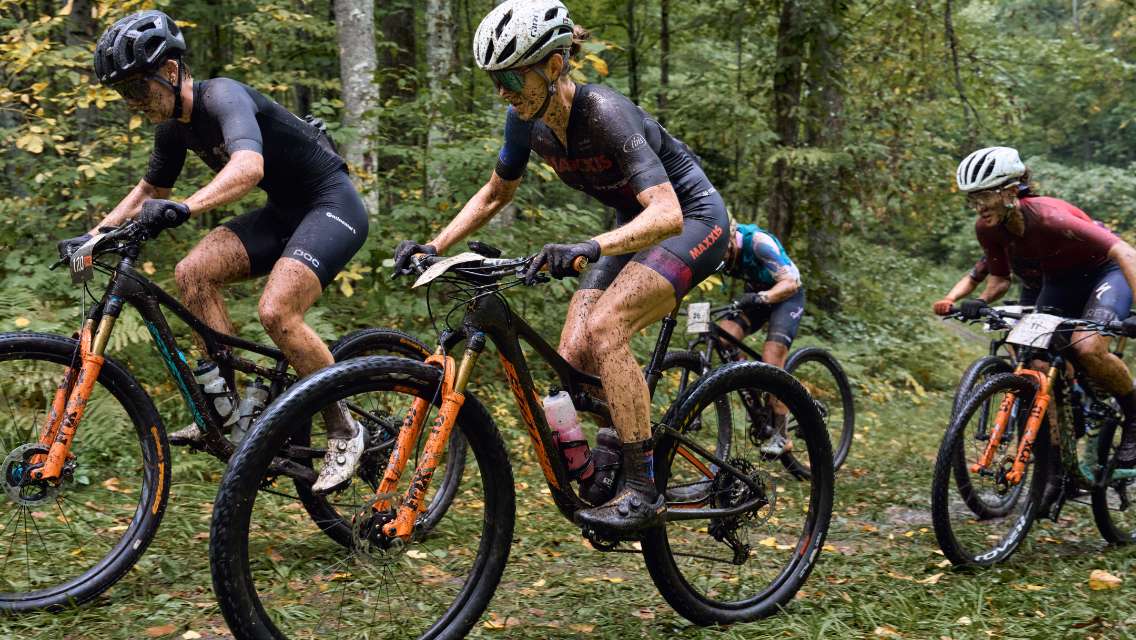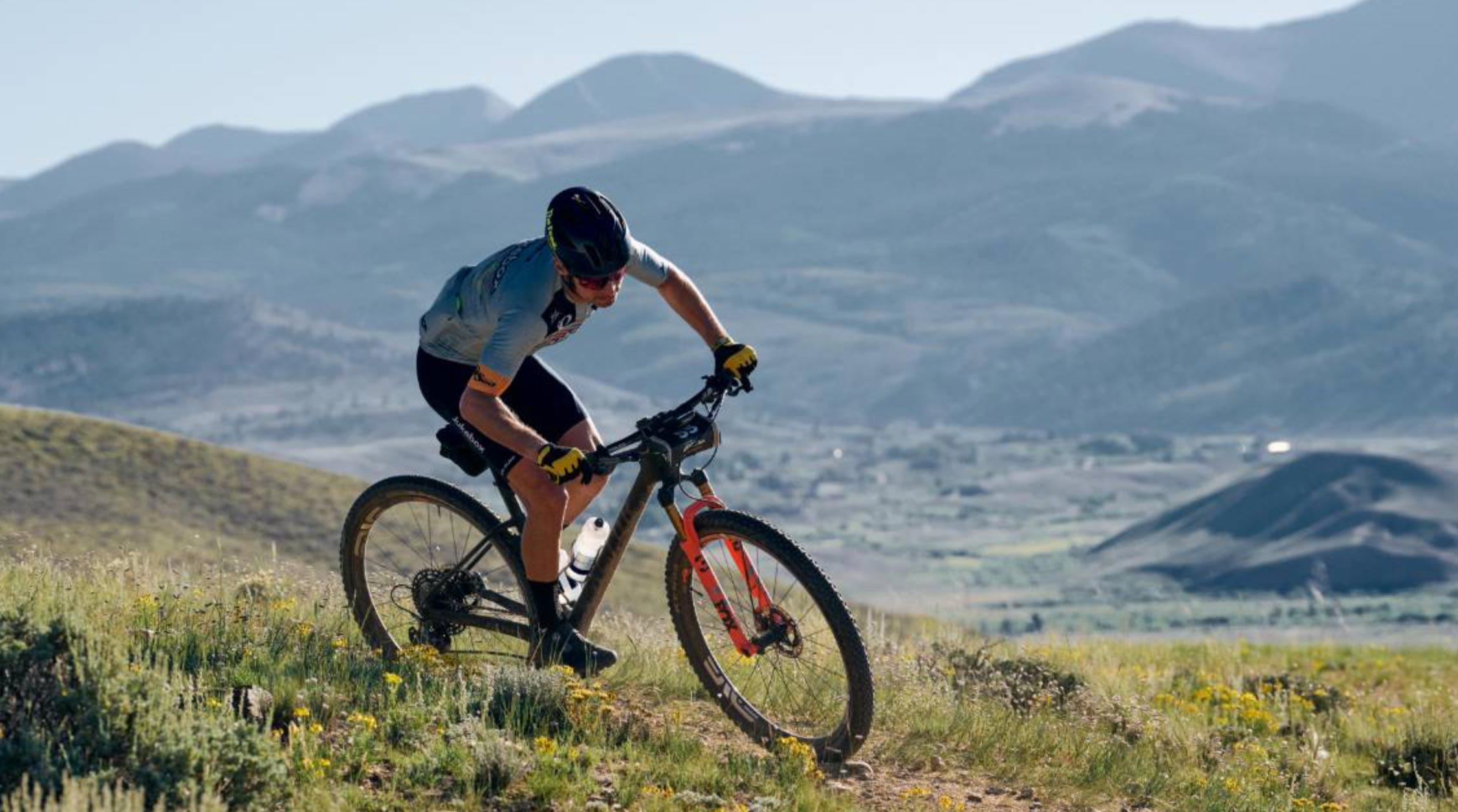Anyone can chase excellence, but defining what excellence means to you and instead chasing that is a true triumph. For Haley Hunter Smith, Olympian and professional off-road cyclist, that change in focus proved to be a groundbreaking shift over the past year.
Some would expect Smith, 30, who competed in the Tokyo 2020 Olympic Games, to continue to pedal toward a medal. But in the years following those games, she found her path led elsewhere.
“We often think of the Olympics as the pinnacle for sports because we make them so,” she says. “I’ve been able to appreciate the riding I do because I’ve learned to value what’s important to me. That has given me freedom.”
Smith’s journey along this route wasn’t always easy; her biking career began during one of the hardest periods in her life.
Though she describes her childhood in the small town of Uxbridge, Ontario, as “pretty amazing,” life brought challenges as she got older. In ninth grade, she was hospitalized and diagnosed with anxiety and anorexia.
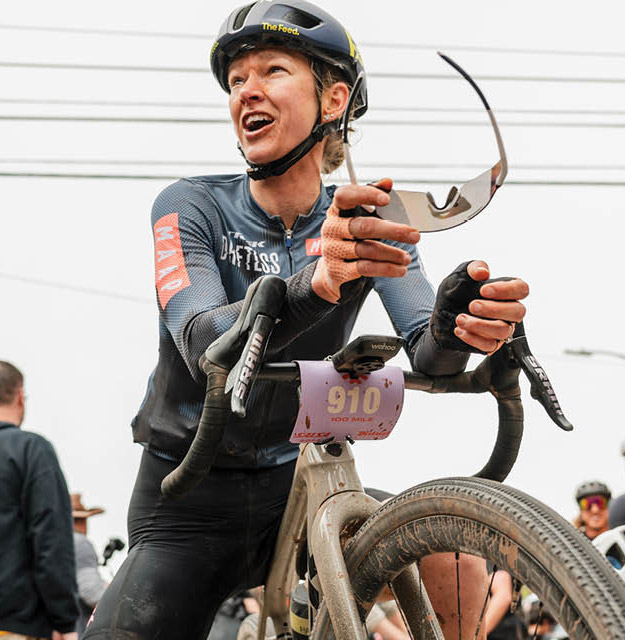 “I was very anxious growing up,” she recalls. “When I went to high school, that transition sent things out of control for me, and my anxiety sharpened into a food focus. Since then, I’ve been rediagnosed with anxiety and orthorexia.”
“I was very anxious growing up,” she recalls. “When I went to high school, that transition sent things out of control for me, and my anxiety sharpened into a food focus. Since then, I’ve been rediagnosed with anxiety and orthorexia.”
Soon after being released from the hospital, Smith began bicycling — which became a therapy of sorts. “My dad and brother biked recreationally,” she explains. “I started riding with them for fun, but I soon learned it was the only thing that made me feel better from my mental illness.”
Smith also worked with a psychologist and psychiatrist, and she practiced yoga and mindfulness to help manage her diagnoses. “Nothing was as powerful as the bike, though. Being outside grounds me and makes me feel less anxious. I can just breathe.”
After a few years of riding recreationally, Smith, at 17, tapped into her competitive nature and started racing.
“I started out riding in a Thursday-night race series, then raced in Ontario Cup events, then Canada Cup races.”
From there, she progressed to the Canadian Mountain Bike National Championships before being invited to participate in some World Cup races. By the time she turned 20, in 2013, Smith was on the professional circuit — and had set her sights on the Olympics.
For nearly seven years, Smith competed full-time. Though she had a few setbacks, she generally experienced more success each year — culminating in her selection to Team Canada for the 2020 Olympic Games.
But her performance didn’t match her dreams. “I was drowning in pressure,” she recalls. “I didn’t realize it then, but I was struggling so much.”
Despite top-10 finishes in a number of qualifiers, she finished 29th in the cross-country mountain-bike event.
“I struggled with the pressure and scrutiny that came with competing, and honestly, just underperformed,” she recalls. “It was emotionally, mentally, and physically a lot to handle — on top of it also being during the pandemic. I didn’t handle it well. I was working with a psychologist and several other performance specialists — a dietitian, physiologist, therapist, etc. — throughout the whole Olympic quadrennial.”
Looking back, Smith has learned that challenging scenarios like those she experienced during the Olympics tend to bring disordered-eating behaviors and thinking back to the forefront. So she decided to step away from Olympic mountain biking.
“A few years ago, I would have said I’ve overcome my eating disorder. Now, I’m not so naive,” she says. “The thought and behavior patterns that are characteristic of my eating disorder are deeply ingrained, and though those pathways may become buried or disused, they’re still there. It’s something I will always have to be aware of and work around. Practicing self-awareness is key.
“Sometimes that looks like a formal meditation practice; other times it’s journaling. Recently, I started working with a dietitian again, and I’ve received more professional help.”
After taking some time off, Smith competed in her first gravel race, UNBOUND Gravel, in 2022. She went on that year to win the women’s division of the Life Time Grand Prix off-road cycling series — the pinnacle of months of training and dedication.
In 2023, Smith placed third in the series, won the Canadian Cross-Country Marathon national title, and finished second at a Cross-Country Marathon World Cup.
“I’m focusing more on endurance racing now because it feels like a place where I have a lot of curiosity,” she explains. “In a way, I feel like I reached the ceiling with what I was capable of with Olympic racing. There is so much to explore with endurance racing — both literally and internally.”
Q&A With Haley Hunter Smith
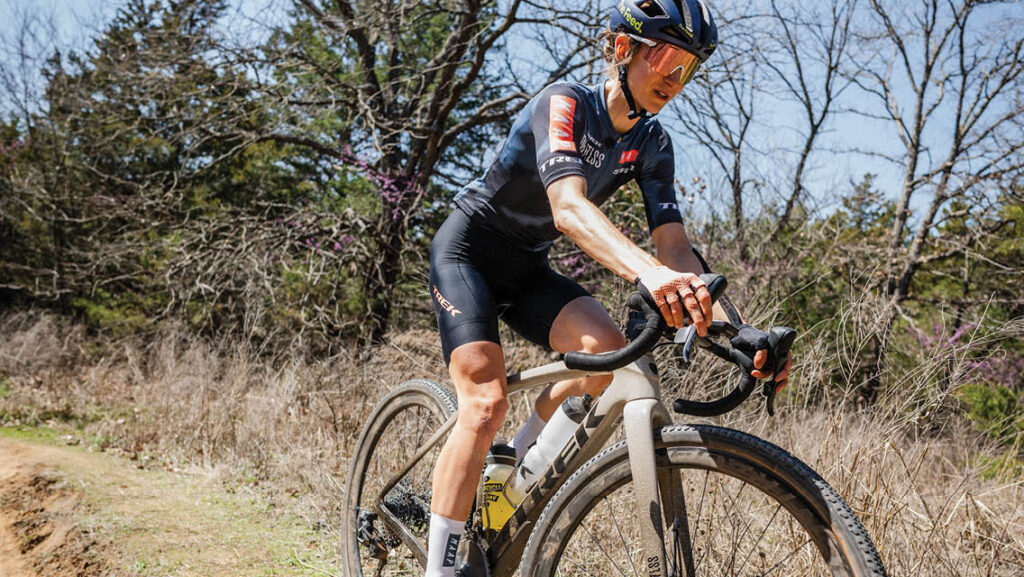
Experience Life :: You’re dedicated to helping others who struggle with their mental health. Can you explain why and speak to some of the things you’ve done?
Haley Hunter Smith :: I’ve been living with my diagnosis since I was young. I go through periods when I feel like I have great mental health and periods when I feel like I have terrible mental health. I knew people must be able to relate to me.
I realized that I had an opportunity to show kids they don’t have to be defined by a diagnosis and that they can achieve whatever they want. The only thing they need to do is have a dream and have the courage to pursue it. That became my purpose, and my mountain bike became the method.
I started to speak publicly about [mental health] in my early 20s, and that was scary at first. But when I went through the worst of my struggles in ninth grade, I was so alone because nobody talked about that kind of stuff yet. It was the “pre-destigmatization” era. I made a choice that I would do whatever was in my power to make sure no one else went through it the same way I did.
I spoke at local clubs to raise awareness and reach girls, specifically, who might not otherwise have been reached. It progressed from there and became like a pro bono speaking gig that I would do.
Through that, I ended up being connected with a lot of people who were going through something similar for one-on-one mentor relationships.
There’s also an organization called Cam’s Kids that helps kids manage anxiety, and I helped launch that organization as their first youth ambassador. I’ve also given guest lectures to university students on mental health and sports performance.
I’m currently advancing my education in hopes of continuing to make a difference. I chose to go into sports psychology for my master’s and am in a lab that focuses on youth development. This is a group of master’s and doctoral students and faculty members who conduct qualitative and quantitative research into youth development through sport. I’ll begin pursuing my PhD in sports psychology in fall 2024.
I hope that in the future I can make impacts on sports policies and sports delivery — providing sports as an experience and opportunity for youth in terms of programming, leagues, etc. — so kids are given a better outlook and more mental health skills when they’re younger.
EL | What advice would you give someone who is struggling with their mental health or knows someone who is dealing with these issues?
HHS | The first step is to tell somebody. It will make the situation so much better, and it takes courage to do that. If you can even just tell one person, that is the first step to finding support for your journey to better mental well-being.
You don’t deserve to feel this way, you don’t have to feel this way, and you don’t have to be a prisoner to this disordered way of thinking. If you can take that first step and share what you’re feeling with someone, I highly encourage you to do it.
EL | What’s next for you with riding?
HHS | I recently signed with Trek, specifically representing their Driftless gravel-bike team, which is really exciting. Signing with this company allows me to focus solely on endurance racing and have the confidence and assurance to not feel like I have to pursue cross-country Olympic racing simultaneously.
My goal this year is to race at UNBOUND Gravel, Leadville, the UCI Gravel World Championships, and the UCI Mountain Bike Marathon World Championships. I’m also competing in the Life Time Grand Prix again this year.
Unfortunately, I was recently diagnosed with asthma, so I’m learning how to deal with that while continuing to ride. The asthma makes it hard for my lungs and throat to function properly, but I’m learning how to respond to it while also managing my anxiety. I’ve learned if I panic while feeling an asthma attack coming on, it starts a negative feedback loop. Therefore, I’m learning to control my response to the physiological sensation of it. (Struggle with panic attacks, too? See “What to Do When a Panic Attack Occurs.”)
EL | You found biking to be therapeutic for you. What advice would you give to someone who wants to try biking for the first time?
HHS | Don’t be intimidated. It’s supposed to be fun, and it doesn’t matter if you’re not wearing the “right” gear or if you look goofy. It’s just a fun thing to do and it’s great for your mental and physical health.
An easy way to get into biking is through gravel or riding on rail trails. It’s a little safer than roads and you don’t have to worry about traffic. I’d say just don’t be intimidated and give it a try. Don’t worry about what you look like or if you feel like you don’t belong on a bike because the answer is yes, you belong.
